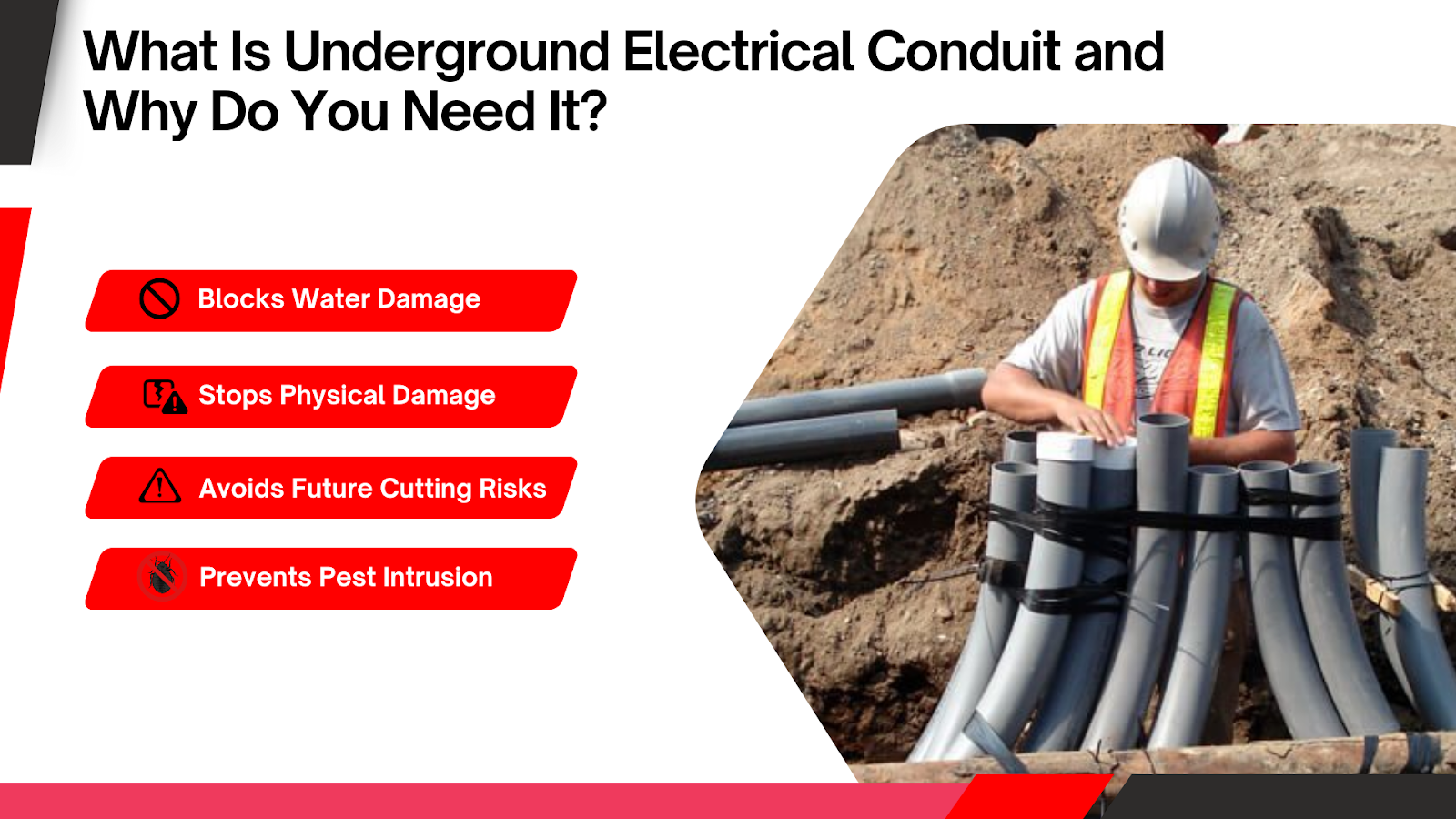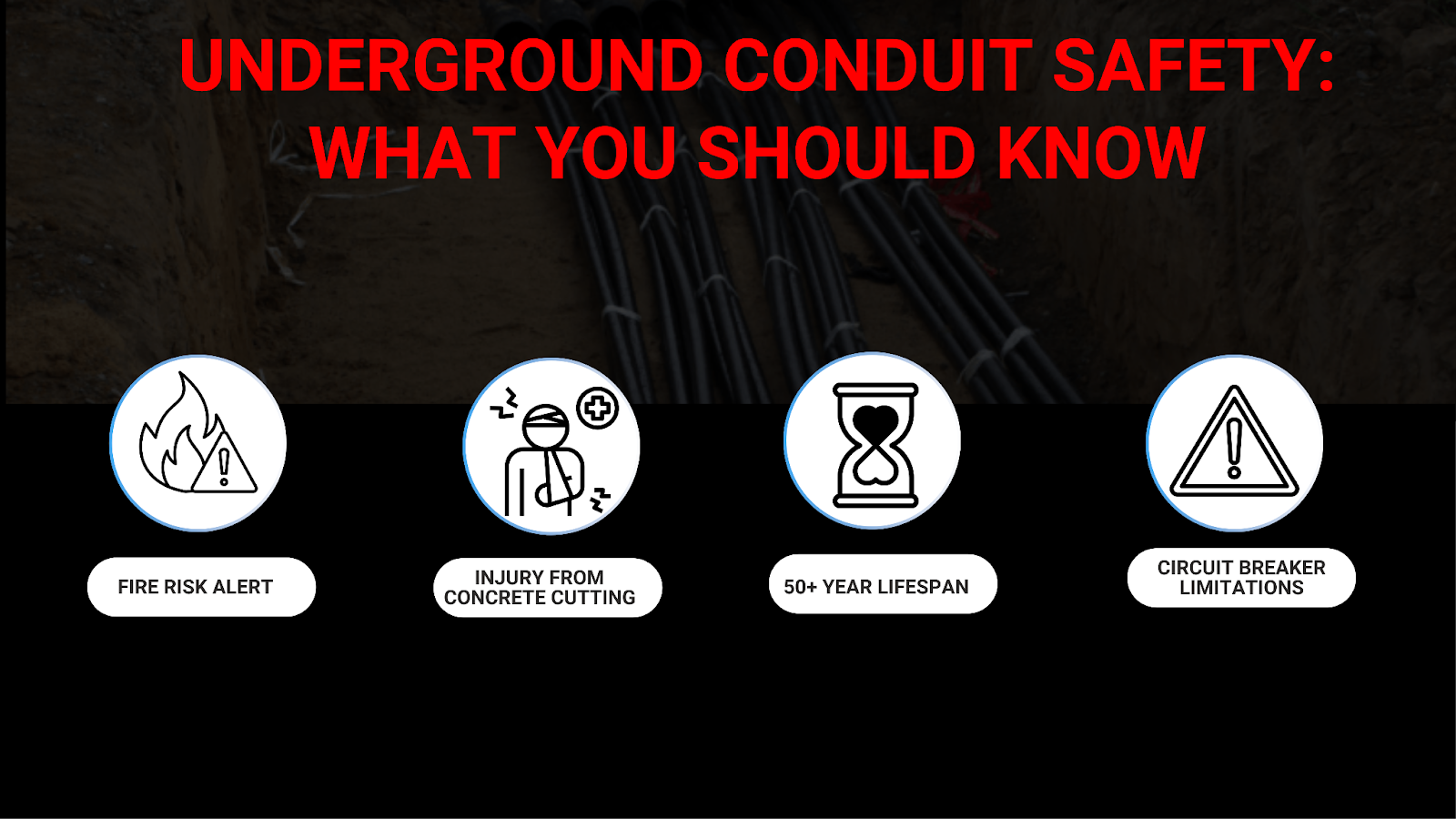Are you building a new home or adding to your existing one? Understanding underground conduit installation is key to safe, long-lasting electrical systems. Our team helps homeowners across Australia install electrical conduits under concrete slabs that meet all safety rules and building codes.
We operate from Box Hill, NSW 2765, and understand what local homes need. We install reliable underground and in-slab conduit solutions that protect your wiring and prepare your site for future electrical work. Our licensed electricians handle everything neatly and make sure it’s ready for inspection or installation. We avoid delays and leave your site clean and organised.
Furthermore, we provide underground and in-slab conduit work across Kellyville, Marsden Park, Schofields, Beaumont Hills, Blacktown, Castle Hill, Rouse Hill, Riverstone, Quakers Hill, The Gables, Oakville, Glenhaven, and Dural. Furthermore, if you need underground or in-slab conduit work, you can directly call us.
What Is Underground Electrical Conduit and Why Do You Need It?
An underground electrical conduit is a protective tube that houses electrical wires under your concrete slab. These orange PVC pipes keep your wiring safe from:
- Water damage
- Pest problems
- Physical damage from soil movement
- Accidental cutting during future home projects
Having a proper conduit installed before pouring concrete is much easier and cheaper than fixing electrical problems later. The AS/NZS 3000 Wiring Rules require all underground electrical wiring to be properly protected.
For preparing wiring in your home, see our electrical wiring services in Sydney.

Australian Standards You Need to Know
When installing electrical conduit under your house slab, two main rules apply:
- AS/NZS 3000:2018 (Wiring Rules) – The main rules that all electrical work must follow
- AS/NZS 2053 – Special rules about what materials to use and how deep to bury conduits
These standards are not just suggestions – they’re legal requirements across Australia. Breaking these rules can lead to failed inspections, safety risks, and insurance problems.
How Deep Should Your Electrical Conduit Be?
The depth requirements for electrical conduit vary across Australia:
Under House Slabs:
- NSW/QLD/NT/TAS: 50-100mm minimum
- South Australia: 75mm minimum
- Western Australia: 100mm minimum
- ACT: 50mm minimum
Under Driveways or Traffic Areas:
- All states: 600mm minimum
Under Garden or Non-Traffic Areas:
- All states: 300mm minimum
Following these depth rules helps protect your wiring and meets legal requirements for your Electrical Safety Certificate.
The Right Materials Make All the Difference
Not all conduits are created equal! For underground electrical work, you need:
- Orange PVC Conduit – The standard for electrical work (the orange colour warns people digging that electrical wires are inside)
- Heavy-Duty HDPE Conduit – Sometimes used for extra protection in areas with heavy soil movement
- Orange Marker Tape – Placed above the conduit as an extra warning
- IP-Rated Junction Boxes – For any connections that need to be made underground
Using the right materials with the correct IP rating ensures your electrical system stays dry and safe for decades.
When Do You Need Underground Electrical Conduit Services?
You’ll need professional underground conduit installation during:
- New Home Construction – Before the concrete slab is poured
- Major Home Renovations – When adding new rooms or extending your house
- Outdoor Electrical Projects – For powering sheds, pools, or garden lighting
- Fixing Damaged Underground Wiring – When existing wires have failed due to poor installation
Most conduit work happens during the electrical rough-in stage, before your concrete slab is poured, but after your home’s layout is marked out. For renovation or upgrades, check out our switchboard upgrades in Sydney.

Our Professional Installation Process
When you choose our services, here’s what happens:
- Planning – We map out all electrical points and plan conduit paths before any digging starts
- Trenching – We dig trenches to the correct depth for your state and situation
- Conduit Installation – We lay properly sized PVC conduit with smooth bends for easy wire pulling
- Separation from Other Services – We keep electrical conduits away from water and gas lines as required
- Pre-Concrete Inspection – We arrange for inspection before the pour
- Documentation – We provide all required certificates and diagrams of your underground electrical layout
Our licensed electrical contractors handle everything from start to finish, giving you peace of mind.
DIY vs. Professional Installation: What You Need to Know
While some homeowners consider DIY for underground conduit, here’s why professional installation is better:
| DIY Installation | Professional Installation |
| May not meet changing local codes | Always up – to – date with current standards |
| Risk of incorrect depth | Proper depth guaranteed with doc |
| Future liability issues | Work is insured and guaranteed |
Remember: Any underground electrical work must be certified by a licensed electrical contractor to be legal in Australia. DIY electrical work is illegal in most situations across Australia.
Safety Facts You Should Know
Here are some important facts about underground electrical conduit safety:
- Poorly installed conduit is a leading cause of electrical fires in Australian homes
- Concrete cutting through unmarked electrical conduits causes several serious injuries each year
- Orange PVC conduit lasts 50+ years when properly installed
- Circuit breakers alone won’t protect against all underground wiring faults
- Professional slab penetration services can safely add conduit access points even after concrete is poured
Learn more about our emergency electrical services in Sydney if issues occur during construction.

Ready to Get Started? Contact Us Today!
Don’t risk your home’s electrical safety with improper underground conduit installation. Our Clean Energy Council-approved electricians are ready to help with your project.
Contact Rightech Electrical today to schedule your underground conduit installation and enjoy peace of mind knowing your home’s wiring is safe, future-ready, and fully compliant.
Frequently Asked Questions
1. What size electrical conduit should be used under a concrete slab?
For most homes, 25mm diameter conduit is the minimum size for power circuits. Data cables usually need 20mm conduit. We recommend using larger 32mm conduit for main power runs to allow for future wiring needs.
2. Do I need an electrician to install underground conduit?
Yes. By law, all electrical work in Australia must be done by a licensed electrical contractor. This includes installing conduit that will later contain electrical wiring.
3. How do you run electrical conduits in the same trench as plumbing?
Electrical conduits must be separated from water pipes by at least 100mm. Different colored conduits (orange for electrical, white for communications, etc.) help identify each service. Special separation rules apply when crossing other services.
4. What permits are required for an underground electrical conduit?
You’ll need electrical work permits and possibly council permits, depending on your location. Our team handles all permit applications as part of our service.
5. What happens if my conduit gets damaged during construction?
If damage occurs before the concrete pour, we can replace the damaged sections. If damage happens during the pour, we have special methods to repair or reroute conduits to maintain electrical safety.

